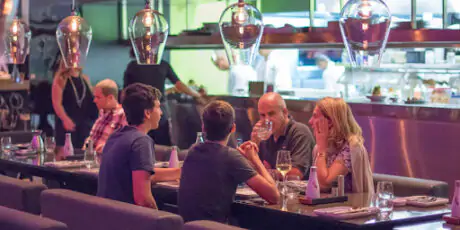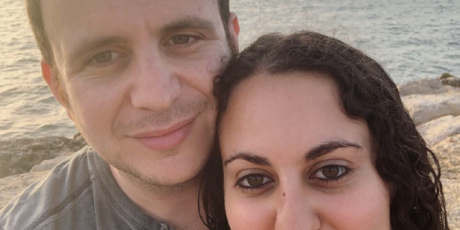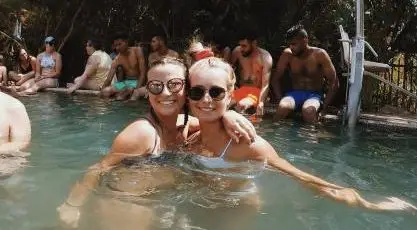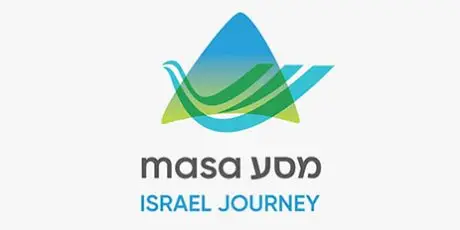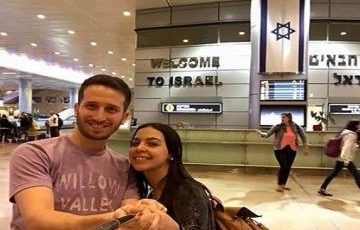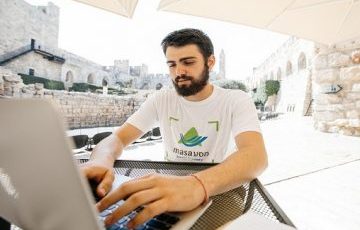
By Rebecca Haas, Masa Israel Teaching Fellows Alumna
On a rainy Friday evening in May, I entered a JCC to participate in a Shabbat dinner. As I walked through the lobby, the aromas of brisket and warm bread filled the air. I passed tables laid out with enough salads and appetizers to serve a hundred people, and I could see a table in front with challah, candles, and a Kiddush cup filled with wine. Around me, my friends were introducing themselves to those nearby, offering up a “Shabbat shalom” to each. It could have been any Shabbat, in practically any city. It certainly felt that way to me, which is why I kept forgetting that I was, in fact, sitting in a JCC in Poland.
Yes, in Poland. Before arriving there, I, like many others, assumed that Jewish life in Poland was just history. I had imagined a rather bleak place, strewn with remnants of the atrocities of the Holocaust, and a community void of Judaism. It had certainly come as a surprise, then, when we entered the lively and bright JCC of Krakow for our first Shabbat dinner.
Together with other young professionals and college students from Masa Israel Journey programs in Israel, I had traveled to Poland with the Masa-GLI Wilf Family Holocaust Education Program to learn about the Shoah, as well as the modern, Jewish communities that now exist there. We visited Auschwitz-Birkenau and Treblinka, saw what once were the ghettos of Krakow and Warsaw, and walked through the horrifying forests and mass graves of the countryside. Seeing these sights gave a powerful context to the Holocaust learning I have had in the past, and invoked strong and raw emotions as we, a group of Jews living in Israel, walked through our people’s history.
But such moments were matched with moments where we felt inspired and could look into the future as we explored the current community centers of Poland, met young, local Jews, and experienced the growing Jewish community in its entirety.
Halfway through my journey, I began to compare this budding community to my own. I then formulated a question that had been stirring around in my mind: What can WE (the Jews of the Diaspora) learn from this revitalizing Jewish community of Poland?
As a Masa Israel Teaching Fellow, I spend my days teaching English to elementary school students in Israeli schools. However, my job is not just to instruct students on the rules of the present progressive tense or the correct English words for popular foods. It is to inspire my students to continue learning long after I have left Israel, and to help them gain the confidence they need to explore the language on their own. Essentially, my goal is to help develop the next generation of Israel. A daunting task, to say the least.
But the Jews of Poland have done just that. Many young adults do not discover their own Judaism until their aging relatives, the generation that survived WWII, divulge their Jewish ancestry on their deathbeds. Having grown up with little or no Jewish exposure, these young Jews turn to the Jewish community for answers, to fill a void they have discovered in their lives. In order to make them feel more at home, the Jewish community inspires these young adults to take charge and become leaders. They are encouraged to plan and execute their own community programs and holiday celebrations, so they can instill them with ways that would interest their own generation, and encourage others of their age group to become more invested in the community.
As a teacher, I have similarly found that assigning authentic assignments empowers my students to go the extra mile, to think deeply about what they are asked to do, and to truly learn from the experience. For instance, we held a debate, and the topic was decided by the students. Because they chose their own topic, they were particularly interested in defending their own beliefs, just as the Jewish youth of Poland are encouraged to put significant effort into activities and events that they choose to organize.
We were fortunate to experience these young people’s creativity first-hand. Covering the walls of both the Warsaw and Krakow JCCs were posters advertising upcoming events, reminiscent of a student center at a university and including a basketball tournament, book discussions, Sunday brunch (popular with young adults everywhere seeking to cure their hangovers). All of these activities were quite simply things that I, or any young adult, would partake in anyway, whether it is a Jewish event or not.
To me, this is what sets this community apart, the idea that the Jewish community can be involved in every single aspect of life. Instead of associating Judaism with Hebrew school and studying for a Bar or Bat Mitzvah, the Jewish community is a place for community and leisure, a center of life for every age group, for every hobby, for every interest. Anything you would like to do can be put in a Jewish context, creating a bond that extends beyond tradition. The connection to Judaism is then transformed into friendship, family, recreation, and everything in between.
This past May, I left Poland with an incredibly positive outlook on the Polish Jewish community. The community is building leaders who are preparing to carry on the Jewish traditions for generations to come, planting the seeds for growth in the coming years. I hope to return to Poland someday, perhaps with children of my own, to see a Jewish community that is strong and proud, and that has influenced Jewish life around the world.
Rebecca Haas, a Londonderry native and resident, currently serves as a Masa Israel Teaching Fellow in Rishon LeZion, Israel. She graduated in 2015 from the University of Maryland, College Park with a degree in elementary education.
Together with other young professionals and college students from Masa Israel Journey programs in Israel, I had traveled to Poland with the Masa-GLI Wilf Family Holocaust Education Program to learn about the Shoah, as well as the modern, Jewish communities that now exist there. We visited Auschwitz-Birkenau and Treblinka, saw what once were the ghettos of Krakow and Warsaw, and walked through the horrifying forests and mass graves of the countryside. Seeing these sights gave a powerful context to the Holocaust learning I have had in the past, and invoked strong and raw emotions as we, a group of Jews living in Israel, walked through our people’s history.
But such moments were matched with moments where we felt inspired and could look into the future as we explored the current community centers of Poland, met young, local Jews, and experienced the growing Jewish community in its entirety.
Halfway through my journey, I began to compare this budding community to my own. I then formulated a question that had been stirring around in my mind: What can WE (the Jews of the Diaspora) learn from this revitalizing Jewish community of Poland?
As a Masa Israel Teaching Fellow, I spend my days teaching English to elementary school students in Israeli schools. However, my job is not just to instruct students on the rules of the present progressive tense or the correct English words for popular foods. It is to inspire my students to continue learning long after I have left Israel, and to help them gain the confidence they need to explore the language on their own. Essentially, my goal is to help develop the next generation of Israel. A daunting task, to say the least.
But the Jews of Poland have done just that. Many young adults do not discover their own Judaism until their aging relatives, the generation that survived WWII, divulge their Jewish ancestry on their deathbeds. Having grown up with little or no Jewish exposure, these young Jews turn to the Jewish community for answers, to fill a void they have discovered in their lives. In order to make them feel more at home, the Jewish community inspires these young adults to take charge and become leaders. They are encouraged to plan and execute their own community programs and holiday celebrations, so they can instill them with ways that would interest their own generation, and encourage others of their age group to become more invested in the community.
As a teacher, I have similarly found that assigning authentic assignments empowers my students to go the extra mile, to think deeply about what they are asked to do, and to truly learn from the experience. For instance, we held a debate, and the topic was decided by the students. Because they chose their own topic, they were particularly interested in defending their own beliefs, just as the Jewish youth of Poland are encouraged to put significant effort into activities and events that they choose to organize.
We were fortunate to experience these young people’s creativity first-hand. Covering the walls of both the Warsaw and Krakow JCCs were posters advertising upcoming events, reminiscent of a student center at a university and including a basketball tournament, book discussions, Sunday brunch (popular with young adults everywhere seeking to cure their hangovers). All of these activities were quite simply things that I, or any young adult, would partake in anyway, whether it is a Jewish event or not.
To me, this is what sets this community apart, the idea that the Jewish community can be involved in every single aspect of life. Instead of associating Judaism with Hebrew school and studying for a Bar or Bat Mitzvah, the Jewish community is a place for community and leisure, a center of life for every age group, for every hobby, for every interest. Anything you would like to do can be put in a Jewish context, creating a bond that extends beyond tradition. The connection to Judaism is then transformed into friendship, family, recreation, and everything in between.
This past May, I left Poland with an incredibly positive outlook on the Polish Jewish community. The community is building leaders who are preparing to carry on the Jewish traditions for generations to come, planting the seeds for growth in the coming years. I hope to return to Poland someday, perhaps with children of my own, to see a Jewish community that is strong and proud, and that has influenced Jewish life around the world.
Rebecca Haas, a Londonderry native and resident, currently serves as a Masa Israel Teaching Fellow in Rishon LeZion, Israel. She graduated in 2015 from the University of Maryland, College Park with a degree in elementary education.
